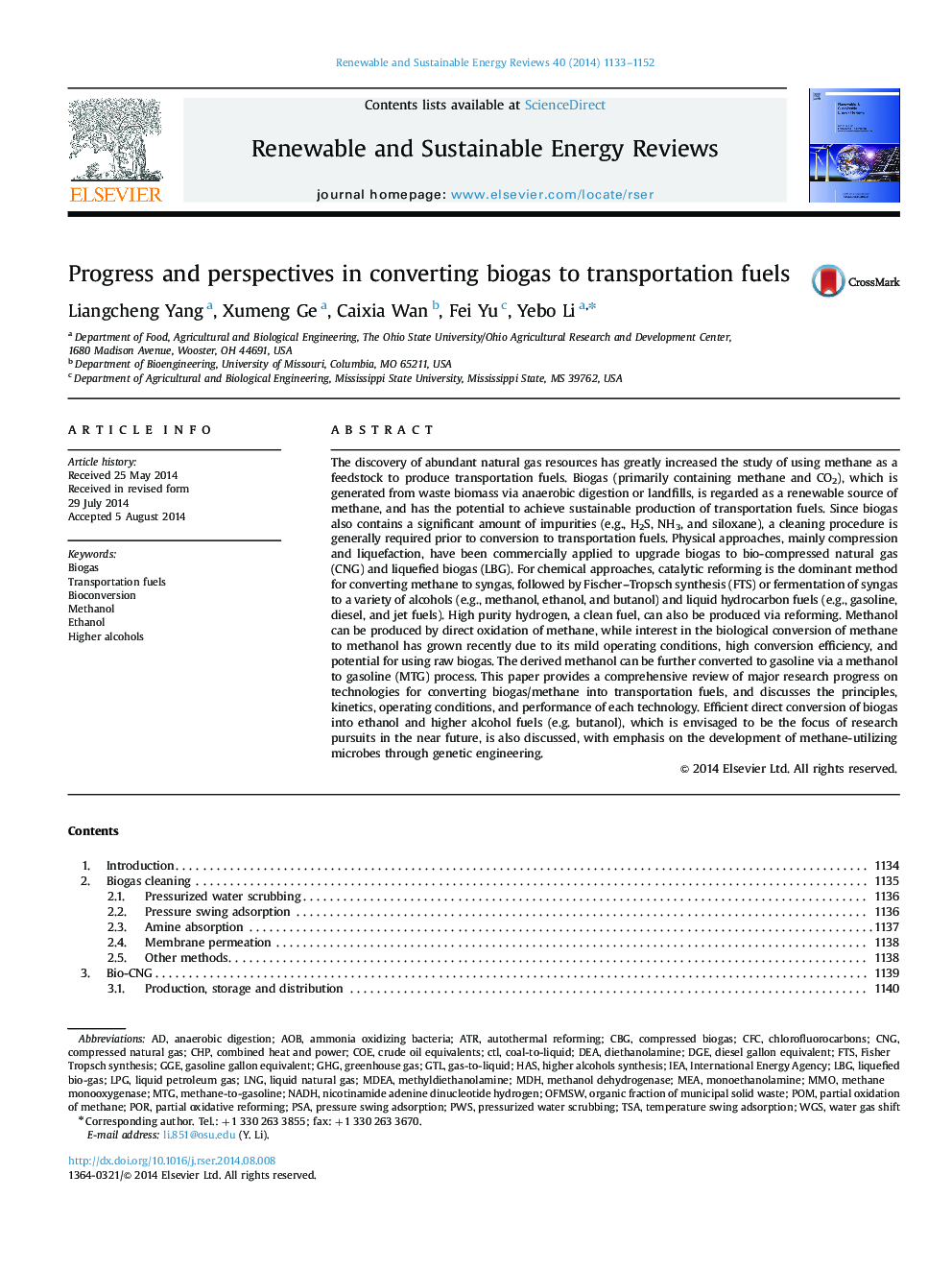| کد مقاله | کد نشریه | سال انتشار | مقاله انگلیسی | نسخه تمام متن |
|---|---|---|---|---|
| 8119206 | 1522345 | 2014 | 20 صفحه PDF | دانلود رایگان |
عنوان انگلیسی مقاله ISI
Progress and perspectives in converting biogas to transportation fuels
ترجمه فارسی عنوان
پیشرفت و دیدگاه در تبدیل بیوگاز به سوخت حمل و نقل
دانلود مقاله + سفارش ترجمه
دانلود مقاله ISI انگلیسی
رایگان برای ایرانیان
کلمات کلیدی
HASDEATSAATRAOBIEAPSAPWSMTGWGSPOMGTLOFMSWCBGMDHPORMMOFTSDGEGGEMDEACFCMEALBGLPGGHGCHPCTLCNGLNGInternational energy agency - آژانس انرژی بین المللیEthanol - اتانولHigher alcohols - الکل بزرگPartial oxidation of methane - اکسیداسیون جزئی از متانAmmonia oxidizing bacteria - باکتری اکسید کننده آمونیاکBiogas - بیوگازBioconversion - تبدیل زیستیCombined Heat and Power - ترکیب گرما و قدرتWater Gas Shift - جابجایی گازTemperature swing adsorption - جذب دما نوساناتpressure swing adsorption - جذب نوسان فشارdiethanolamine - دی اتانولینAutothermal reforming - ریفرمینگ اتوترمال یا اصلاح اتوترمالCoal-to-liquid - زغال سنگ به مایعHigher alcohols synthesis - سنتز الکل بزرگTransportation fuels - سوخت حمل و نقلmethane monooxygenase - متان مونواکسیژنازMethanol - متانولMethanol dehydrogenase - متانول دهیدروژنازmethyldiethanolamine - متیل دی اتانولامینMonoethanolamine - مونو اتانولامینNADH - نادانnicotinamide adenine dinucleotide hydrogen - نیکوتین آمید آدنین دیونوکوتید هیدروژنAnaerobic digestion - هضم بیهوازیCoe - همorganic fraction of municipal solid waste - کسر آلی از ضایعات جامد شهریChlorofluorocarbons - کلروفلوئوروکربن هاGas-to-liquid - گاز به مایعcompressed natural gas - گاز طبیعی فشردهLiquid petroleum gas - گاز مایعliquid natural gas - گاز مایع طبیعیGreenhouse gas - گاز گلخانه ای
موضوعات مرتبط
مهندسی و علوم پایه
مهندسی انرژی
انرژی های تجدید پذیر، توسعه پایدار و محیط زیست
چکیده انگلیسی
The discovery of abundant natural gas resources has greatly increased the study of using methane as a feedstock to produce transportation fuels. Biogas (primarily containing methane and CO2), which is generated from waste biomass via anaerobic digestion or landfills, is regarded as a renewable source of methane, and has the potential to achieve sustainable production of transportation fuels. Since biogas also contains a significant amount of impurities (e.g., H2S, NH3, and siloxane), a cleaning procedure is generally required prior to conversion to transportation fuels. Physical approaches, mainly compression and liquefaction, have been commercially applied to upgrade biogas to bio-compressed natural gas (CNG) and liquefied biogas (LBG). For chemical approaches, catalytic reforming is the dominant method for converting methane to syngas, followed by Fischer-Tropsch synthesis (FTS) or fermentation of syngas to a variety of alcohols (e.g., methanol, ethanol, and butanol) and liquid hydrocarbon fuels (e.g., gasoline, diesel, and jet fuels). High purity hydrogen, a clean fuel, can also be produced via reforming. Methanol can be produced by direct oxidation of methane, while interest in the biological conversion of methane to methanol has grown recently due to its mild operating conditions, high conversion efficiency, and potential for using raw biogas. The derived methanol can be further converted to gasoline via a methanol to gasoline (MTG) process. This paper provides a comprehensive review of major research progress on technologies for converting biogas/methane into transportation fuels, and discusses the principles, kinetics, operating conditions, and performance of each technology. Efficient direct conversion of biogas into ethanol and higher alcohol fuels (e.g. butanol), which is envisaged to be the focus of research pursuits in the near future, is also discussed, with emphasis on the development of methane-utilizing microbes through genetic engineering.
ناشر
Database: Elsevier - ScienceDirect (ساینس دایرکت)
Journal: Renewable and Sustainable Energy Reviews - Volume 40, December 2014, Pages 1133-1152
Journal: Renewable and Sustainable Energy Reviews - Volume 40, December 2014, Pages 1133-1152
نویسندگان
Liangcheng Yang, Xumeng Ge, Caixia Wan, Fei Yu, Yebo Li,
